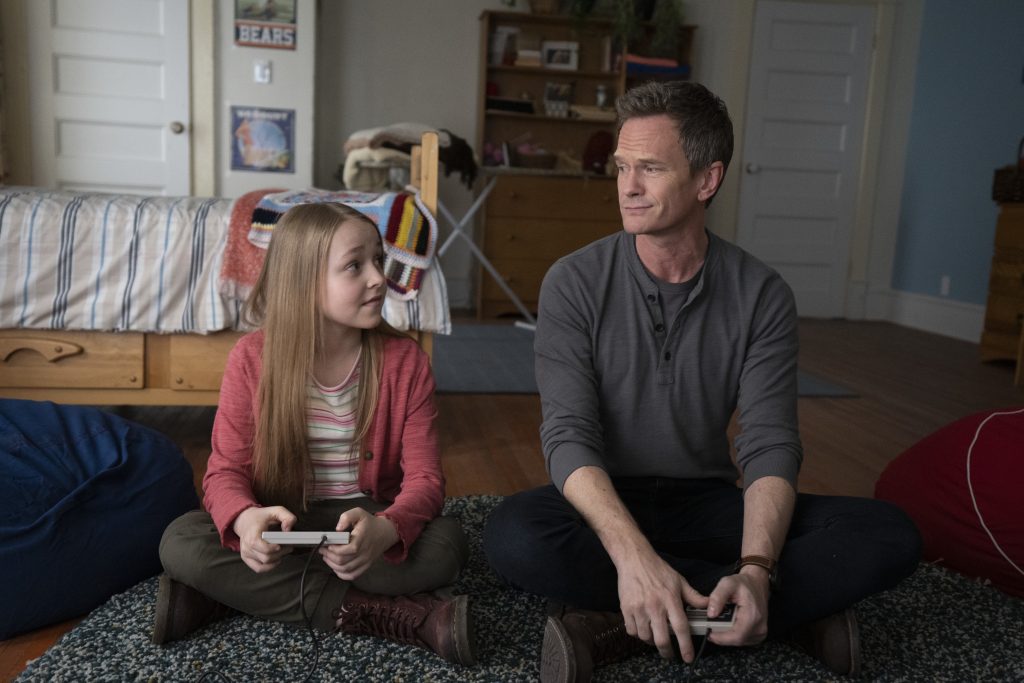8-Bit Christmas, Bellaluna Resnick, Brealyn Rankins, Brielle Rankins, Che Tafari, Chicago, Clay Arnold, comedy, HBO Max, Jacob Laval, June Diane Raphael, Max Malas, Michael Dowse, movies, Neil Patrick Harris, Nintendo, reviews, Santino Barnard, Sofie Michal Maiuri, Sophia Reid-Gantzert, Steve Zahn, TV, Winslow Fegley
December 26, 2021
by Carla Hay

Directed by Michael Dowse
Culture Representation: Taking place in the Chicago area in the present day and in 1988, the comedy film “8-Bit Christmas” features a predominantly white cast of characters (with some African Americans) representing the working-class, middle-class and wealthy.
Culture Clash: A man in his mid-40s tells his 11-year-old daughter the story of his misadventures in 1988, when he was an 11-year-old boy who desperately wanted a Nintendo Entertainment System for Christmas, even though his parents forbade him from playing video games at the time.
Culture Audience: “8-Bit Christmas” will appeal primarily to people who are interested in watching lightweight Christmas holiday comedies that are steeped heavily in 1980s nostalgia.

The formulaic family comedy “8-Bit Christmas” is elevated by a watchable and occasionally amusing performance by Winslow Fegley as an 11-year-old boy in 1988 who goes to great lengths to get a Nintendo Entertainment System for Christmas. Directed by Michael Dowse, “8 Bit Christmas” is really just a series of slapstick scenarios that culminate in a sentimental “life lesson” that’s expected in a movie with a Christmas theme. Kevin Jakubowski adapted the “8-Bit Christmas” screenplay from his 2013 novel of the same name. The movie is best appreciated by viewers who have some fondness for 1980s nostalgia or who know how big of a deal a Nintendo Entertainment System was to many kids during this decade. (The movie’s title refers to the primitive 8-bit data resolution of 1980s video games.)
“8-Bit Christmas” begins with a man in his mid-40s named Jake Doyle (played by Neil Patrick Harris), who is traveling with his 11-year-old daughter Annie Doyle (played by Sophia Reid-Gantzert) to the home of Jake’s widowed mother for a Christmas holiday visit. Jake grew up in Batavia, Illinois (a suburb of Chicago), where his mother still lives. Annie has been pestering Jake to get her a smartphone for Christmas.
Jake adamantly refuses because he thinks Annie is too young to have this type of phone. Annie has to use Jake’s phone, only when he’s with her. It’s embarrassing to Annie that she doesn’t have her own phone, but Jake won’t change his mind.
Instead, Jake tells Annie about the time in 1988, when he was Annie’s age and was obsessed with getting a Nintendo Entertainment System for Christmas. Jake says to Annie, “When I was a kid, I wanted a Nintendo worse than you wanted a phone.” Annie replies, “That’s not possible.”
Jake is prompted into telling this story when he and Annie arrive at his mother’s house and they find his old Nintendo Entertainment System in the room that Jake had as a child. Annie knows that there was a time when Jake’s parents didn’t allow him to play video games, so she wants to know how he ended up with a Nintendo Entertainment Sysem . Most of the movie then switches to flashback mode when Jake tells his story in voiceover narration, with occasional scenes that go back to the present-day Jake and Annie.
In 1988, 11-year-old Jake (played by Winslow Fegley) considered himself to be an average boy in an average middle-class American family. His parents John Doyle (played by Steve Zahn) and Kathy Doyle (played by June Diane Raphael) are happily married. Jake has a precocious younger sister named Lizzy (played by Bellaluna Resnick), who is about 6 or 7 years old in 1988. Lizzy is a “goody-two-shoes” child who likes to snitch on Jake to their parents whenever Jake does something wrong.
The kids at Jake’s school are envious of a spoiled rich boy named Timmy Keane (played by Chandler Dean), who’s apparently the only kid for miles who has his own Nintendo Entertainment System. Therefore, small crowds of children gather in front of Timmy’s house on a regular basis because they want to get invited inside Timmy’s home to play Nintendo games with him. However, Timmy will only allow certain kids inside, based on whatever gifts or favors they can offer to him.
Needless to say, Timmy is an obnoxious brat who takes advantage of his social status to make some kids feel bad about themselves if they don’t get invited into his house. Timmy has an elaborate play area in his home that would rival any recreational arcade for children. The first time that Jake plays Nintendo, it’s at Timmy’s house. Jake instantly gets hooked and wants his own Nintendo Entertainment System.
It’s the same wish for many of Jake’s friends too. Jake hangs out with a small group of kids, who eventually make it their mission to get their own Nintendo system. The close-knit pals in Jake’s clique are:
- Mikey Trotter (played by Che Tafari), whom Jake describes as being allowed to watch R-rated movies, and Mikey has an adult cursing vocabulary and mischievous nature to prove it.
- Evan Olsen (played by Santino Barnard), who is nervous and neurotic.
- Tammy Hodges (played by Brielle Rankins), who is smart and confident.
- Teddy Hodges (played by Braelyn Rankins), who is Tammy’s fun-loving twin brother.
Other kids who are not part of this clique but who factor into the story are:
- Josh Jagorski (played by Clay Arnold), the school’s large and violent bully, who looks like he’s a teenager, not a pre-teen like all the other students.
- Jeff Farmer (played by Max Malas), whom Jake describes as a “pathological liar.”
- Conor Stump (played by Jacob Laval), who is the school’s nerdy social outcast.
- Katie Sorrentino (played by Sofie Michal Maiuri), a classmate who casually observes some of the shenanigans of Jake and his friends.
Jake knows that his parents are not inclined to want to give him a Nintendo Entertainment System for Christmas. Therefore, he comes up with a scheme to trick them into saying yes to his request. With his mother, Jake waits until she’s distracted and asks her for this gift when she’s not really listening to him. She says yes.
With his father, whom an adult Jake describes in a voiceover as a “dyslexic Bob Vila” when it comes to carpentry hobbies, Jake waits until they have some father/son time doing some woodshopping in the garage. Jake compliments his father John on John’s hand strength. Jake says he would like a gift for Christmas that would let him build up his hand strength, so Jake suggests a Nintendo Entertainment System. John says yes to this request too.
But there would be no “8-Bit Christmas” movie if Jake got his wish so easily. Eventually, Jake’s parents (and some of his friends’ parents) become paranoid that video games are bad for children, so the parents are determined to not have anything related to video games in their homes. Undeterred, Jake and his male friends, who are members of the Ranger Scouts, find out about a Ranger Scouts contest where the person who sells the most Christmas wreaths will win the grand prize of a brand-new Nintendo Entertainment System.
A large part of “8-Bit Christmas” is about this race against time to sell the most Christmas wreaths, as friends turn into rivals to win this contest. There’s also some gross-out comedy, such as a scene of a child vomiting profusely and repeatedly, and a joke that goes on for too long about Jake having to clean up defecation from the family dog Ellwood. Not surprisingly, Jake wants avoid cleaning up after the dog as much as possible, so it leads to some minor conflicts with between Jake and his father John.
David Cross has a small role in “8-Bit Christmas” as an unnamed opportunist, who sells toys (probably stolen) out of the trunk of his car. His stash includes a Nintendo Entertainment System and Cabbage Patch dolls. Jake’s sister Lizzy wants a Cabbage Patch doll for Christmas, so Jake feels some sibling jealousy when John is more eager to get Lizzy’s most-wanted Christmas gift but is unwilling to get Jake’s most-wanted Christmas gift.
There’s a lot of mediocre slapstick scenarios in “8-Bit Christmas” that clog up the story. For example, a recurring “joke” in the movies is that Jake’s mother Kathy accidentally bought a pair of girls’ Esprit snow boots (purple with flower-print trimming) during a frenzied shopping sale. Kathy never bothered to get Jake any other boots, because apparently she didn’t want to go back to the store to exchange the Esprit boots for boots that Jake actually wants to wear.
Jake is embarrassed because his mother makes him wear these boots to school and other places when there’s snow outside. (Animotion’s 1984 hit “Obsession” plays on the movie’s soundtrack every time Jake puts on these boots.) And predictably, Jake gets harassed by bully Josh when Josh sees Jake wearing these feminine-looking shoes. It’s a not-very-well-written part of the story because this problem would’ve easily been solved by a merchandise exchange at the store.
Jake’s humiliation for wearing these boots (which is an over-used gag in “8-Bit Christmas”) plays into tired movie/TV stereotypes that anything “feminine” associated with a boy is supposed to automatically be a reason for the boy to be ridiculed and bullied. The movie makes a half-hearted attempt at explaining this sexist trope, by having the adult Jake explain to his daughter Annie that in the 1980s, people were less open-minded about gender equality and many other things. But if the filmmakers wanted a recurring joke about Jake being embarrassed about something that his mother makes him do, they could’ve picked a funnier scenario than Jake having to wear feminine-looking boots.
The good news is that “8-Bit Christmas” at least presents the girls in the movie as just as intelligent if not smarter than the boys. It certainly makes up for how this movie gives most of the screen time and the most adventurous parts of the story to the male characters. It’s pretty obvious that the movie’s main target audience is supposed to be anyone who has nostalgic memories of 1980s Nintendo video games, even though there isn’t one particular Nintendo game that gets spotlighted in the movie.
In terms of the “8-Bit Christmas” cast members, Fegley as the young Jake absolutely carries this movie to any level of charm that it might have to audiences. And that helps a lot, because the young Jake gets the vast majority of the screen time in this movie. Fegley has good comedic timing, and his character is relatable to most people who’ve been an 11-year-old child, regardless of gender. The rest of the cast members are serviceable in their roles, with some of the actors continuing to be typecast as characters they’ve played in many other movies. (Zahn as a goofball; Cross as a sarcastic wiseass.)
“8-Bit Christmas,” which clocks in at a breezy 97 minutes, isn’t the type of movie that’s going to be considered a Christmas holiday classic, but it’s an agreeable way for viewers to pass some time if they want to see an entertaining Christmas holiday film for people in various age groups. The last 20 minutes of “8-Bit Christmas,” which are the best parts of the film, make up for much of the silliness that lowers the quality of the rest of the movie. “8-Bit Christmas” is ultimately a film that’s enjoyable without demanding too much intelligence or emotional investment from viewers.
HBO Max premiered “8-Bit Christmas” on November 24, 2021.
